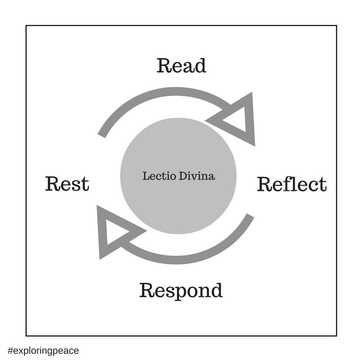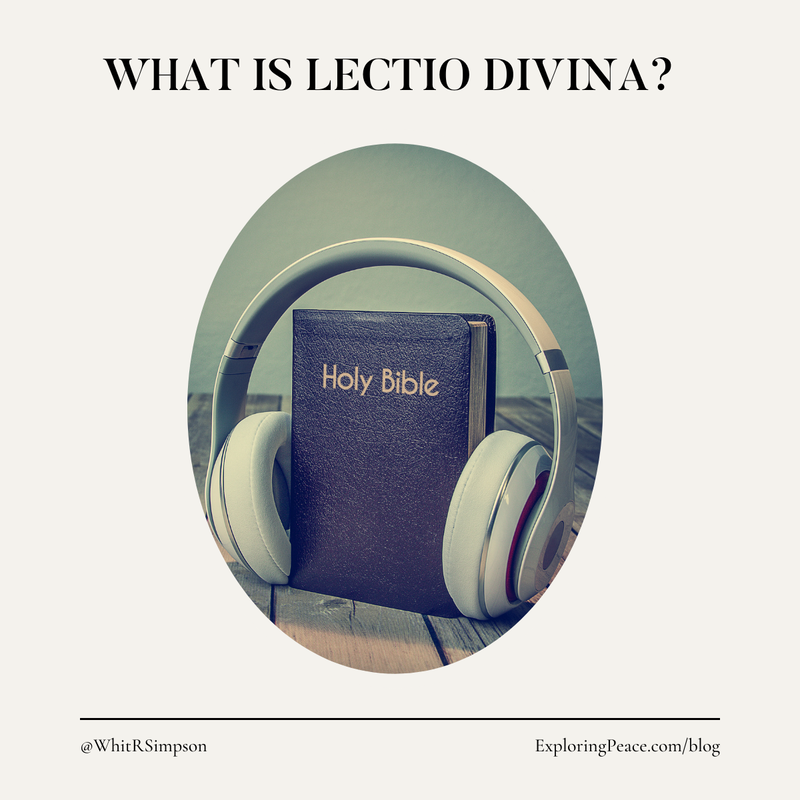|
Latin for spiritual or holy reading, Lectio Divina is an ancient prayer practice that allows us to listen for God’s activity using scripture. This style of prayer lets us listen with an open heart for God’s activity in our life today as we connect to God through the written word. Lectio Divina focuses on the formational reading of scripture rather than the informational reading to gain knowledge about God’s word. While both are important processes, this art is seen as a more personal way to interact with the word of God.
Lectio Divina is an ancient monastic practice that has been modernized by academia with consecutive steps to the process that were likely not defined when it was practiced in the 6th century. For this reason, you'll find varying outlines for the practice in books and across the internet. For all practical purposes, the steps are the same and the process is simply an invitation to enter in to a time of conversation and contemplation.You'll read, reflect, respond and rest in God's word. For those of us who enjoy Bible study, it can be challenging to set down your commentaries and highlighters and simply settle in with God's word with this style of prayer and listening. Yet the rewards have been evident for me as I experience both big and small glimpses of hope and encouragement for how God speaks today through the ancient text of the Bible. Don't come with expectations, just come and listen. Here is a simple overview of Lectio Divina: Read, Reflect, Respond, Rest
Need some companionship in formational listening with scripture? Use my devotional book, Holy Listening with Breath, Body, and the Spirit. Or, listen to a guided Lectio Divina meditation on the Exploring Peace Meditations podcast. Advent is a time of waiting, a time of preparation for Christmas. Let's be honest, waiting is tough right now but this kind of waiting is expectant and exciting. This kind of waiting is pondering the arrival of the one who came as a gift for YOU and the one who gifted you with your body and breath. There is always much to prepare for Christmas - food, decorations, packages. But what if the gift God longs to prepare most is YOU?
This year is different in so many ways. And Christmas can be different for you too, in the best way. What if this Christmas you prepared yourself? What if you made space for your body and your spirit? What if instead of being last on the list, you heard God's nudge and placed yourself at the top of the list? After all, if you care for yourself well you're better able to care for others well too. And, in this season, loving others and ourselves needs to make the top of the list! How do you prepare for Christmas? What are your favorite ways to get ready? Don't worry, I'll still be decking the halls but I'll also be practicing lectio divina, centering prayer and yoga nidra too! Curious? Want to join me in community? Click here to register or learn more about this online advent retreat experience (nope, you don't have to be on social media to participate, one less distraction, yay!). Are you ready for Christmas? 
Scripture reading is an important spiriutal discipline in my life. There are seasons when I long for in-depth Bible study and there are seasons when I long for more of a meditative style scripture reading. The first approach is informational, the second is formational. Both are important on the spiritual formation journey.
Lectio Divina is the style of reading scripture I enjoy most regularly. Clearly, it is one of my favorite ways of spending time with God as my new devotional Holy Listening with Breath, Body, and the Spirit includes 40 different selections for Lectio Divina (latin for meditative reading). It's a fairly simple way, yet also very transformative, to spend time in scripture as you read and reflect on how the scripture touches you. You read, reflect, respond, and rest in God's word. But, where do you start and how do you select a passage if you don't have a guide in your hand? In this season of life, my time in scripture follows the lectionary (a 3-year cycle of readings throughout the old and new testament). There are two main tools I use as my guide for following the lectionary. The first one is published by Upper Room Books each year, Disciplines 2017. This in-depth little book is loaded with deep yet also brief daily thoughts from 52 various writers. Each week the writers reflect on the weekly lectionary passages and invite you in to deeper reflection and study. I have turned to Disciplines over the years (for my personal study and for leading small groups). This year, I am truly humbled to be included as one of those 52 writers in the 2017 edition and Iook forward to journeying with these thoughts throughout the year. Next up, and newest to my spiritual formation tool kit, is the Sacred Ordinary Days Planner. This planner includes the current lectionary passages for the week and follows the liturgical year. The liturgical year is also known as the Christian Year. It includes all the seasons of the church (lent, advent, easter, etc.). If you're new to discovering the rhythm of the liturgical year and long for a community of resources, check out Sacred Ordinary Days! My friend, Jenn Giles Kemper, is the founder of this soul-stirring company (you can check out the new calendars at the link below). Sacred Ordinary Days now offers weekly and monthly formatted planners for your year and include much more than simply a guide to the liturgical calendar. Great for personal reflection and for daily planning. Check them out! It is with Lectio Divina, the Lectionary, and embracing the Liturgical year that I discover the rhythm I long for in a new calendar year. How do you plan to spend time in God's word in 2017? |
Whitney R. SimpsonClick to connect: Categories
All
Content @ 2010-2023
Whitney R. Simpson Exploring Peace Ministries, LLC |




 RSS Feed
RSS Feed
